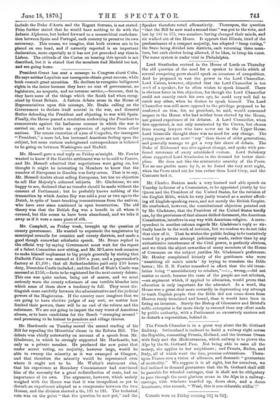Lord Stratheden revived in the House of Lords on Thursday
the old question of the need for a speaker to decide which of several competing peers should speak on occasions of competition. And he proposed to vest the power in the Lord Chancellor. Lord Cairns, however, objected that the Lord Chancellor is too much of a speaker, for he often wishes to speak himself. There is obvious force in this objection, for though the Lord Chancellor could not exactly catch his own eye, he could very well fail to catch any other, when he desires to speak himself. The Lord Chancellor was still more opposed to the privilege proposed to be conferred on him, for, no president, he said, would command respect in the House who had neither been elected by the House, nor gained experience of its debates. A Lord Chancellor, when first appointed, is not only nominated by the Crown, but chosen from among lawyers who have never sat in the Upper House. Lord Granville thought there was no need for any change. The young peers are not more " coy " than those of older generations, and generally manage to get a very fair share of debate. The Duke of Richmond was also against change, and spoke with pro- found reverence of every established custom. Lord Salisbury alone supported Lord Strathedeu in the demand for better disci- pline. lie does not like the aristocratic anarchy of the Peers. Yet no one profits more by it, as he found the very next night, when the Peers cried out for him rather than Lord Grey, and the Contents had it.






























 Previous page
Previous page